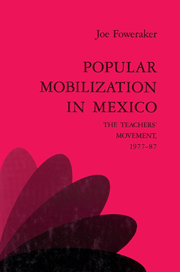Book contents
- Frontmatter
- Contents
- Preface
- Glossary of acronyms
- Introduction: The character and context of popular mobilization in contemporary Mexico
- PART I POPULAR MOVEMENT AND SYNDICAL STRUGGLE
- PART II INSIDE THE MOVEMENT IN CHIAPAS
- 4 Leadership and grass roots
- 5 Strategic choices
- 6 Factional strife
- PART III NATIONAL MOBILIZATION AND SYSTEM RESPONSES
- PART IV POPULAR MOVEMENTS AND POLITICAL CHANGE
- Bibliography
- Index
5 - Strategic choices
Published online by Cambridge University Press: 29 September 2009
- Frontmatter
- Contents
- Preface
- Glossary of acronyms
- Introduction: The character and context of popular mobilization in contemporary Mexico
- PART I POPULAR MOVEMENT AND SYNDICAL STRUGGLE
- PART II INSIDE THE MOVEMENT IN CHIAPAS
- 4 Leadership and grass roots
- 5 Strategic choices
- 6 Factional strife
- PART III NATIONAL MOBILIZATION AND SYSTEM RESPONSES
- PART IV POPULAR MOVEMENTS AND POLITICAL CHANGE
- Bibliography
- Index
Summary
The teachers' movement of Chiapas not only pioneered new forms of organization but also crafted unusual political strategies (Reyes 1980). The leaders of the ETAs movement (see Chapter 2) insisted that its success was a result of its “method of mobilization,” which was “the only correct method of struggle” (Chispa Sindical, October 1983). Above all, there was “no trusting the famous DIALOGUE, which only serves to slow movements down,” and they lamented that the first Central Strike Committee of June 1979 had “opted for negotiation” (Chispa Sindical, June 1979). But in retrospect, it is clear that the teachers were correct to resist the siren calls of the “ultraleft” and so avoid an “all or nothing” confrontation. Instead they mobilized the base while simultaneously carrying on negotiations, in a combination that the Línea Proletaria tendency graphically described as “war in Vietnam, negotiations in Paris” (Arellanes Caballero, Constantino, and Peralta Esteva 1985). Without mobilization there would be no negotiation, but exclusive use of this “method” would invite defeat. By combining the two, the teachers could pursue an overall strategy of “partial advances” and tactical retreats.
Many of the teachers' leaders came from the radical rural training schools and had later joined in the violent struggles of the Advanced School in Mexico City. Some of them had taken part in the guerrilla wars of the early 1970s. If the movements had arisen two or three years earlier, they might never have sought negotiation and the movement itself might never have prospered. But they had learned from their failures and now favored a more flexible approach, which the Chiapas delegation defended in the National Conference of the CNTE in September 1980.
- Type
- Chapter
- Information
- Popular Mobilization in MexicoThe Teachers' Movement 1977–87, pp. 75 - 87Publisher: Cambridge University PressPrint publication year: 1993



